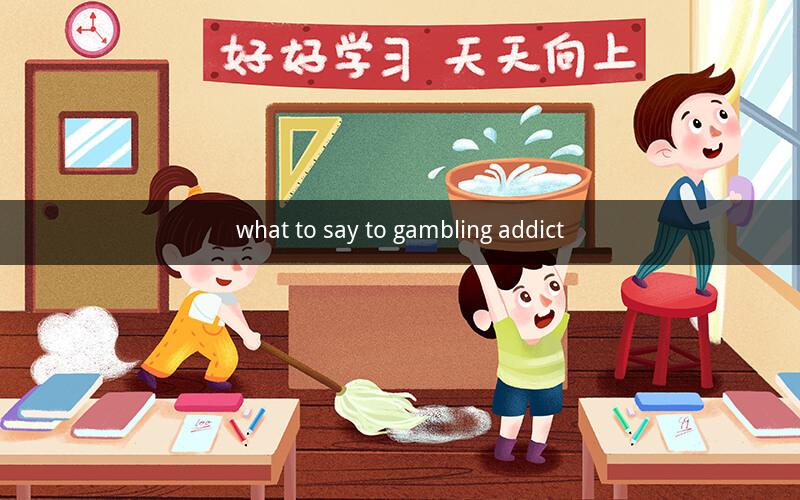
Table of Contents
1. Understanding the Problem
2. The Importance of Communication
3. Phrases to Use
4. How to Approach the Conversation
5. Listening Skills
6. Professional Help
7. Encouragement and Support
8. Setting Boundaries
9. Dealing with Denial
10. Aftermath and Follow-Up
1. Understanding the Problem
Gambling addiction is a serious issue that can have devastating effects on an individual's life, as well as the lives of those around them. Before you can effectively communicate with a gambling addict, it is crucial to have a clear understanding of the problem. This includes recognizing the signs of addiction, such as increased spending, lying, and neglecting responsibilities.
2. The Importance of Communication
Communication is key when dealing with a gambling addict. Open, honest, and non-judgmental conversations can help the individual recognize the severity of their problem and take the necessary steps to seek help. Here are some phrases that can be used during these conversations.
3. Phrases to Use
- "I care about you and want to help you find a way to overcome your addiction."
- "Your behavior is causing me concern, and I want to support you through this difficult time."
- "It's important for you to understand that gambling is not a solution to your problems."
- "Let's work together to find healthier ways to cope with stress and boredom."
- "I'm here to listen and offer support, but you need to be willing to take the first step."
4. How to Approach the Conversation
When approaching the conversation, it is essential to be calm, empathetic, and non-confrontational. Choose a private and comfortable setting where the individual will feel safe to open up. Avoid placing blame or becoming angry, as this may lead to defensiveness and further resistance.
5. Listening Skills
Listening is a critical skill when dealing with a gambling addict. Pay close attention to their words and emotions, and try to understand their perspective. This will help you offer more personalized support and build trust between you and the individual.
6. Professional Help
Encourage the individual to seek professional help from a therapist or counselor specializing in gambling addiction. A professional can provide tailored guidance and treatment options to help the individual overcome their addiction.
7. Encouragement and Support
Offer ongoing encouragement and support throughout the recovery process. Celebrate small victories and milestones, and be there to help them through the tough times. Let them know that you are committed to their journey and will be there for them every step of the way.
8. Setting Boundaries
It may be necessary to set boundaries to protect yourself and the individual from the negative consequences of their addiction. This can include limiting financial support or setting clear rules about behavior.
9. Dealing with Denial
Be prepared for the individual to deny their addiction or become defensive. It is important to remain firm and consistent in your support, while also being understanding and patient. Remember that overcoming addiction is a gradual process, and it may take time for the individual to acknowledge their problem.
10. Aftermath and Follow-Up
After the initial conversation, continue to monitor the individual's progress and offer support as needed. Stay in touch with them, and be prepared to offer assistance if they experience setbacks. Remember that recovery is a lifelong journey, and your support can make a significant difference.
FAQs
1. What should I do if the individual refuses to seek help?
- Continue to offer support and encouragement, but be prepared to set boundaries if their behavior becomes harmful.
2. How can I help the individual cope with the emotional aspects of addiction?
- Encourage them to participate in therapy or support groups, where they can find comfort and guidance from others who have faced similar challenges.
3. Is it my responsibility to pay for the individual's gambling debts?
- No, it is not your responsibility. Encourage the individual to take responsibility for their actions and seek help to address their addiction.
4. How can I help the individual rebuild their relationships with family and friends?
- Encourage them to attend family therapy sessions or support groups, where they can work on rebuilding trust and communication.
5. What if the individual relapses after seeking help?
- Be understanding and non-judgmental. Encourage them to reflect on the reasons for the relapse and continue to offer support.
6. How can I help the individual develop healthier coping mechanisms?
- Suggest activities and hobbies that can help them manage stress and boredom without resorting to gambling.
7. Is it appropriate to confront the individual about their addiction in front of others?
- No, it is best to have a private conversation to avoid embarrassment and further resistance.
8. How can I support the individual during the recovery process?
- Offer ongoing encouragement, be available to listen, and celebrate their progress, no matter how small.
9. What if the individual is resistant to change?
- Remain patient and persistent, and be prepared to set boundaries if their behavior becomes harmful.
10. How can I take care of myself while supporting the individual?
- Seek support from friends, family, or support groups, and prioritize self-care activities to maintain your own well-being.